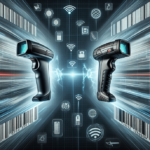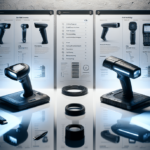Honeywell Xenon 1900g vs Honeywell Voyager 1200g
Barcode scanners are essential tools for businesses, enabling quick and accurate data capture. Two of the most popular scanners on the market are the Honeywell Xenon 1900g and the Honeywell Voyager 1200g. Both products are manufactured by Honeywell, a company renowned for producing high-quality products in the auto-ID industry. In this article, we provide an in-depth comparison of these two devices to help you make an informed decision when purchasing a barcode scanner for your business.
Introduction to Honeywell Xenon 1900g and Honeywell Voyager 1200g
The Honeywell Xenon 1900g and Honeywell Voyager 1200g are two of the most reliable and efficient barcode scanners available. Commonly used in industries such as healthcare, retail, logistics, and manufacturing, these scanners are designed to accurately capture barcodes even under challenging conditions.
The Honeywell Xenon 1900g is a high-performance scanner capable of reading 1D, 2D, and PDF417 barcodes with ease. It features a custom sensor optimized for barcode scanning, ensuring accurate and fast scanning. Additionally, its durable design can withstand multiple drops from up to 6 feet, making it suitable for demanding environments.
The Honeywell Voyager 1200g, on the other hand, is a versatile scanner that excels at reading standard 1D barcodes. It boasts a single-line laser scanner that can scan barcodes from up to 17 inches away. Its lightweight design, weighing only 119 grams, ensures ease of use for extended periods.
Design and Ergonomics Comparison
The design and ergonomics of a barcode scanner play a crucial role in user experience and productivity. The Honeywell Xenon 1900g is built for heavy usage, featuring a durable rubberized body that offers a secure grip. With dimensions of 104mm x 71mm x 160mm and weighing 147 grams, it is designed to withstand rigorous handling.
In contrast, the Honeywell Voyager 1200g prioritizes user comfort with its lightweight and ergonomic handle, reducing user fatigue during prolonged use. Measuring 60 mm x 30 mm x 168mm and weighing 119 grams, it is more compact and easier to maneuver.
An additional feature of the Xenon 1900g is its vibration mode, providing tactile feedback upon successful scans. This is particularly beneficial in noisy environments where audible beeps may be missed. The Voyager 1200g relies solely on audible feedback.
Scanning Performance Comparison
Scanning performance is a critical factor for any business. The Honeywell Xenon 1900g outperforms the Voyager 1200g in both speed and accuracy. Capable of scanning up to 340 scans per second, the Xenon 1900g also has an impressive scanning range of up to 82 inches, compared to the Voyager 1200g's 100 scans per second and 53-inch range.
According to Honeywell's official specifications, the Xenon 1900g's wider field of view allows it to capture barcodes from various angles and orientations, enhancing its versatility in dynamic environments. Additionally, its robust build makes it ideal for industrial or warehouse settings where durability is paramount.
The Voyager 1200g remains a reliable and efficient choice for businesses seeking a more affordable option without compromising essential scanning capabilities. Its ability to read barcodes on curved or reflective surfaces adds to its adaptability across different applications.
Connectivity Options
Connectivity options determine how seamlessly a barcode scanner integrates into existing systems. Both the Honeywell Xenon 1900g and Voyager 1200g offer USB connectivity, ensuring compatibility with most computers and POS systems. However, the Xenon 1900g provides additional connectivity options, including Bluetooth and Ethernet, facilitating wireless data capture and network integration.
This makes the Xenon 1900g particularly advantageous for businesses requiring multiple scanners connected to a single network, enhancing productivity through wireless data transmission. The Voyager 1200g, while limited to USB connectivity, still offers reliable performance for setups where wireless connectivity is not a necessity.
Compatibility with Different Barcodes
Barcode compatibility is essential for versatility in various business operations. Both scanners support a wide range of barcode formats, including data matrix codes, QR codes, and UPC codes. The Xenon 1900g, however, extends its compatibility to more complex barcodes such as Stacked GS1 and PDF417 codes, which the Voyager 1200g does not support.
This expanded compatibility makes the Xenon 1900g a superior choice for businesses that handle diverse barcode types, including those on mobile devices and computer screens. Nevertheless, the Voyager 1200g's compatibility is sufficient for most standard business needs, offering a balance between functionality and cost-effectiveness.
Durability and Reliability Comparison
In demanding business environments, the durability and reliability of equipment are non-negotiable. Both the Honeywell Xenon 1900g and Voyager 1200g are engineered to withstand harsh conditions with rugged designs that protect against drops and impacts. The Xenon 1900g boasts an IP41 rating, safeguarding it against water, dust, and other particulates, while the Voyager 1200g has an IP42 rating, providing similar protection.
Additionally, the Xenon 1900g's ability to read 2D barcodes and its higher scanning speed further enhance its reliability and efficiency in high-demand environments. This makes it a preferred choice for industries requiring consistent and high-volume scanning operations.
Pricing Comparison
Pricing is a pivotal factor for businesses when selecting a barcode scanner. The Honeywell Voyager 1200g is generally more affordable, making it an attractive option for small businesses or those with budget constraints. Its cost-effectiveness does not compromise its reliability, offering adequate performance for standard scanning needs.
Conversely, the Xenon 1900g is positioned as a premium scanner, reflecting its advanced features, superior performance, and enhanced durability. While it represents a higher initial investment, its long-term benefits in high-volume and demanding environments may justify the cost for larger businesses.
User Feedback and Reviews
Customer feedback is invaluable for assessing the real-world performance of barcode scanners. Both the Honeywell Xenon 1900g and Voyager 1200g have garnered positive reviews from users across various industries. Users praise the Xenon 1900g for its exceptional speed, accuracy, and durability, often highlighting its ergonomic design and tactile feedback features.
The Voyager 1200g is similarly well-received, with users appreciating its affordability, ease of use, and reliable performance for everyday scanning tasks. However, the Xenon 1900g generally receives more accolades for its superior capabilities, making it the preferred choice for businesses with more intensive scanning requirements.
Which Scanner is Best for Your Business Needs?
Choosing the right barcode scanner depends on your specific business needs and operational demands. The Honeywell Voyager 1200g is ideal for small businesses with moderate scanning requirements, offering a budget-friendly solution without sacrificing essential functionality.
In contrast, the Honeywell Xenon 1900g suits larger businesses that demand high-volume, intensive scanning in rugged environments. Its superior scanning performance, expanded connectivity options, and enhanced durability make it a valuable investment for operations that rely heavily on barcode scanning.
Other notable scanners include the Zebra DS2208, known for its ability to read both 1D and 2D barcodes, and the Motorola LI4278, which offers both wired and wireless connectivity. These alternatives provide additional options depending on specific business requirements and budgets.
Final Verdict: Which Scanner Comes Out on Top?
The final decision between the Honeywell Xenon 1900g and the Voyager 1200g hinges on your business's scale and scanning demands. For small to medium-sized businesses seeking cost-effective and reliable scanning solutions, the Voyager 1200g is an excellent choice. However, for larger enterprises requiring high-performance, durable scanners capable of handling intensive usage, the Xenon 1900g stands out as the superior option.
Investing in the Xenon 1900g may offer long-term benefits through increased efficiency and reduced downtime, particularly in environments where scanning volume and durability are critical.
Conclusion and Future Outlook for Barcode Scanners
The Honeywell Xenon 1900g and Honeywell Voyager 1200g are among the top barcode scanners available, each catering to different business needs. Both scanners demonstrate Honeywell's commitment to quality and innovation in the auto-ID industry.
As technology continues to advance, barcode scanners are expected to incorporate more sophisticated features such as enhanced wireless connectivity, improved scanning algorithms, and greater compatibility with emerging barcode formats. Staying informed about these developments and choosing a scanner that adapts to future needs will ensure sustained efficiency and accuracy in your business operations.
For more information on barcode scanners and to explore the latest models, visit ShipScience's Barcode Scanner Collection.






















